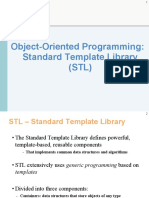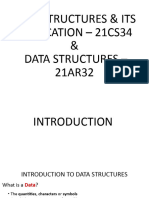Unit - 5 Oodp Final
Unit - 5 Oodp Final
Uploaded by
shashwatCopyright:
Available Formats
Unit - 5 Oodp Final
Unit - 5 Oodp Final
Uploaded by
shashwatOriginal Title
Copyright
Available Formats
Share this document
Did you find this document useful?
Is this content inappropriate?
Copyright:
Available Formats
Unit - 5 Oodp Final
Unit - 5 Oodp Final
Uploaded by
shashwatCopyright:
Available Formats
Unit - 5
•STL: Containers: Sequence and Associative Container
•Sequence container: Vector, List, Deque,Array
•Associative Containers : Map, Multimap, Iterator,
•Functions of Iterator
•Algorithms: find(), count(), sort(), search(), merge()
•Function object: for_each(), transform()
•Streams and Files: Introduction
•Classes and Errors
•Disk File Handling Reading Data and writing Data
STL: Containers: Sequence and
Associative Container
• The Standard Template Library (STL) is a collection of classes
that provide templated containers, algorithms and iterators.
• It contains common classes or algorithms so that the
programmers can use them without having to write and debug
the classes.
Components of STL
Containers Algorithms Iterators
Mrs.B.Ida Seraphim AP/CSE
Containers
Containers are objects that
• Store data
• Define the manner in which data will be stored.
• Are implemented using templates, and can, therefore, store
data of different data types.
Types of containers
Mrs.B.Ida Seraphim AP/CSE
Types of containers
Mrs.B.Ida Seraphim AP/CSE
Algorithms
• Reinforcing the concept of reusability.
• STL algorithms consists of functions that programmers can
directly use in their code to process data stored in different
containers for processing their data.
Mrs.B.Ida Seraphim AP/CSE
Algorithms in STL
Mrs.B.Ida Seraphim AP/CSE
Iterators
• Iterators are pointer like entities that are used to access the
elements stored in the container.
• Iterators are basically used for traversing the elements of
container.
• Container :: iterator – which provides a read/write iterator.
• Container :: const_iterator – which provides a read-only
iterator.
Mrs.B.Ida Seraphim AP/CSE
Types of Iterators
Mrs.B.Ida Seraphim AP/CSE
Vector
• Vectors are sequence containers that represent dynamic arrays
that can change in size.
• Like arrays, vectors store its elements in contiguous memory
locations.
• The main advantage of vectors is that it may grow in size
when number of elements increases and shrink in size when a
number of elements are deleted.
Mrs.B.Ida Seraphim AP/CSE
Mrs.B.Ida Seraphim AP/CSE
Output
• Enter the elements of the vector : 1 2 3 4 5 6 7 8 9 10
• Elements of the vector are: 1 2 3 4 5 6 7 8 9 10
• Contents after inserting an element at 4th position - 1 2 3 4 25 5
6 7 8 9 10.
• Deleting 8th element - 1 2 3 4 25 5 6 7 9 10
Mrs.B.Ida Seraphim AP/CSE
Functions supported by vector
Mrs.B.Ida Seraphim AP/CSE
Dequeue
• A dequeue is a double-ended queue that allows insertions and
deletions at both ends.
Mrs.B.Ida Seraphim AP/CSE
List
• A list is a container in which element points to the next and
previous elements in the list.
• It supports only sequential or linear access. Therefore, if you
want to access the fourth element, you cannot access it
directly.
• You will have to start from the beginning and traverse through
the list until the desired element is found.
Mrs.B.Ida Seraphim AP/CSE
Mrs.B.Ida Seraphim AP/CSE
• Output
• Enter the elements in the 1st list: 1 2 3 4 5
• Enter the elements in the 2nd list: 9 8 7 6 5
• List 1 is: 1 2 3 4 5
• List 2 is: 9 8 7 6 5
• List 1 is: 5 4 3 2 1
• List 2 is: 5 6 7 8 9
• Merged list: 5 4 3 2 1 5 6 7 8 9
Mrs.B.Ida Seraphim AP/CSE
Functions Supported by List
Mrs.B.Ida Seraphim AP/CSE
Associative Container: Maps
• Maps are implemented as associative array in which key is
specified using the subscript operator as Scode[“Delhi”] = 011.
• To insert an entry in the map, write Scode["Chandigarh"]
=072.
• Map supports functions such as begin(), clear(), empty(),
end(), erase(), find(), insert(), size(), and swap() .
Mrs.B.Ida Seraphim AP/CSE
Mrs.B.Ida Seraphim AP/CSE
Output
Enter the city and its code
Delhi 011
Mumbai 022
Chennai 044
Kolkata 088
Number of entries in map: 6
Bangalore 080
Chandigarh 0172
Chennai 044
Delhi 011
Kolkata 088
Mumbai 022
Mrs.B.Ida Seraphim AP/CSE
Multiset
Mrs.B.Ida Seraphim AP/CSE
Mrs.B.Ida Seraphim AP/CSE
Mrs.B.Ida Seraphim AP/CSE
Mrs.B.Ida Seraphim AP/CSE
Iterators
• Iterators are objects that provide access to objects stored in a
container.
• They work as regular pointers in C++.
• They can be used to store and retrieve objects in a container
the same way a pointer accesses objects in c++.
• Types of Iterators
Iterator
Random Access
Input Forward
Output Bidirectional
Mrs.B.Ida Seraphim AP/CSE
Input Iterator
• An input iterator can be used only to retrieve a value from the
input stream it cannot be used to store a value.
• It can only move in the forward direction retrieving the objects
one by one.
• It cannot go backward and it cannot jump.
Mrs.B.Ida Seraphim AP/CSE
Output Iterator
• An output iterator can be used only to store value in an output
stream.
• It cannot be used to retrieve a value.
• It only moves in the forward direction, storing the objects one
by one.
• It cannot go backward and it cannot jump.
Mrs.B.Ida Seraphim AP/CSE
Forward Iterator
• A forward iterator can be used both to retrieve and store a
value.
• It can only move in forward direction, visiting the objects one
by one.
• It cannot go backward and it cannot jump.
Mrs.B.Ida Seraphim AP/CSE
Bidirectional Iterator
• A bidirectional iterator can be used to both retrieve and store
values.
• It moves forward and backward one item at a time.
• It cannot jump.
Mrs.B.Ida Seraphim AP/CSE
Random Access Iterator
• A Random access iterator is like bidirectional operator with
one extra capability, it can jump in both direction.
Mrs.B.Ida Seraphim AP/CSE
Hierarchical Relation
• Every forward iterator is also an input and an output iterator.
• Every bidirectional iterator is also a forward iterator.
• A random access iterartor is also a bidirectional iterator.
Mrs.B.Ida Seraphim AP/CSE
Operators Supported by Iterators
Mrs.B.Ida Seraphim AP/CSE
Algorithms – Find()
Template<class inputiterator, class T>
Inputiterator find(inputiterator first, inputiterator last, const T&
val);
Find value in the range
Returns an iterator to the first element in the range (first, last) that
compares equal to val.
If no such element is found, the function returns last.
The function uses operator== to compare the individual elements to
val.
Mrs.B.Ida Seraphim AP/CSE
Template<class inputiterator, class T>
Inputiterator find (inputiterator first, inputiterator last, const T&
val)
{
while(first !=last)
{
If(*first==val) return first;
++first;
}
return last;
}
Mrs.B.Ida Seraphim AP/CSE
#include <iostream>
#include <algorithm>
#include <vector> Output
int main() Element found in myints: 30
{
int myints[]={10,20,30,40};
int *p;
p=std::find(myints, myints+4, 30);
if (p!= myints+4)
std::cout<<“Element found in myints:”<<*p<<“\n”;
else
std::cout<<“Elements not found in myints \n”;
return 0;
}
Mrs.B.Ida Seraphim AP/CSE
Count()
Template<class inputiterator, class T>
Typename iterator_traits<inputiterator>::difference_type
count (inputiterator first, inputiterator last, const T& val);
Count apperance of value in range
Returns the number of elements in the range (first,last) that
compare equal to val.
The function uses operator== to compare the individual elements
to val.
Mrs.B.Ida Seraphim AP/CSE
Template<class inputiterator, class T>
Typename iterator_traits<inputiterator>::difference_type
Count(inputiterator first, inputiterator last, const T& val)
{
Typename iterator_traits<inputiterator>::difference_type
ret=0;
While(first!=last)
{
if(*first==val) ++ret;
++first;
}
return ret;
}
Mrs.B.Ida Seraphim AP/CSE
#include <iostream>
#include <algorithm>
#include <vector>
int main()
{
int myints[]={10,20,30,30,20,10,10,20};
int mycount=std::count (myints, myints+8, 10);
std::cout<<“10 appears”<<mycount<<“times \n”;
return 0;
}
Output
10 appears 3 times
Mrs.B.Ida Seraphim AP/CSE
Sort()
• Two Types
Default
• Template <class RandomAccessIterator>
• Void sort (RandomAccessIterator first, RandomAccessIterator
last);
Custom
• Template <class RandomAccessIterator, Class Compare>
• Void sort (RandomAccessIterator first, RandomAccessIterator
last, Compare comp);
Mrs.B.Ida Seraphim AP/CSE
Sort elements in range
• Sorts the elements in the range (first, last) into ascending
order.
• The element are compared using operator < for the first
version and comp for the second.
Mrs.B.Ida Seraphim AP/CSE
#include <iostream>
#include <algorithm>
#include <vector>
Bool myfunction (int I, int j) { return (i<j);}
Struct myclass
{
Bool operator() (int I, int j) {return (i<j);}
} myobject;
int main()
{
Int myints[]={32,71,12,45,26,80,53,33};
Std::vector<int>myvector (myints, myints+8); // 32,71,12,45,26,80,53,33
//using default comparison (operator <)
Std::sort(myvector.begin(), myvector.begin()+4); // (12,32,45,71),26,80,53,33
Mrs.B.Ida Seraphim AP/CSE
//using function as comp // 12,32,45,71,(26,33,53,80)
std::sort(myvector.begin()+4, myvector.end(), myfunction)
//using object as comp // (12,26,32,33,45,53,71,80)
std::sort(myvector.begin(), myvector.end(), myobject)
//print out content
std::cout<<“myvector contains”;
for(std::vector<int>::iterator it=myvector.begin();
it!=myvector.end(); ++it)
std::cout<<‘ ‘<<*it;
std::cout<<‘\n’;
return 0;
Output
} Myvector contains: 12 26 32 33 45 53 71 80
Mrs.B.Ida Seraphim AP/CSE
Merge()
Default
• Template<class InputIterator1, class InputIterator2, class
OutputIterator>
• OutputIterator merge (InputIterator1 first1, InputIterator1
last1, InputIterator2 first2, InputIterator2 last2, OutputIterator
result);
Custom
• Template<class InputIterator1, class InputIterator2, class
OutputIterator, class Compare>
• OutputIterator merge (InputIterator1 first1, InputIterator1
last1, InputIterator2 first2, InputIterator2 last2, OutputIterator
result, Compare comp);
Mrs.B.Ida Seraphim AP/CSE
• Merge sorted ranges
• Combines the elements in the sorted ranges (first1,last1) and
(first2,last2) into a new range beginning at result with all its
elements sorted.
Template<class InputIterator1, class InputIterator2, class
OutputIterator>
OutputIterator merge (InputIterator1 first1, InputIterator1 last1,
InputIterator2 first2, InputIterator2 last2, OutputIterator result)
{
while (true) {
if (first1==last1) return std::copy (first2, last2, result);
if (first2==last2) return std::copy (first1, last1, result);
*result++=(*first2<*first1)? *first2++: *first1++;
}
}
Mrs.B.Ida Seraphim AP/CSE
#include <iostream>
#include <algorithm>
#include <vector>
int main()
{
int first[]={5,10,15,20,25};
int second[]={50,40,30,20,10};
std::vector<int>v(10);
std::sort(first, first+5);
std::sort(second, second+5);
std::merge(first, first+5, second, second+5, v.begin());
std::cout<<“The resulting vector conatins”;
for(std::vector<int>::iterator it=v.begin(); it=v.end();++it)
std::cout<<‘ ‘<<*it;
std::cout<<‘\n’;
return 0; Output
The resulting vector contains
} 5 10 10 15 20 20 25 30 40 50
Mrs.B.Ida Seraphim AP/CSE
Search()
• Template <class ForwardIterator1, class ForwardIterator2>
• ForwardIterator1 search(ForwardIterator1 first1,
ForwardIterator1 last1, ForwardIterator2 first2,
ForwardIterator2 last2)
• Template <class ForwardIterator1, class ForwardIterator2,
class BinaryPredicate>
• ForwardIterator1 search(ForwardIterator1 first1,
ForwardIterator1 last1, ForwardIterator2 first2,
ForwardIterator2 last2, BinaryPredicate pred);
Mrs.B.Ida Seraphim AP/CSE
• Search range for subsequence
• Searches the range (first1, last1) for the first occurrence of the sequence defined by
(first2, last2) and returns an iterator to its first element or last1 if no occurrences are
found.
Template<class ForwardIterator1, class ForwardIterator2>
ForwardIterator1 search (ForwardIterator1 first1, ForwardIterator1 last1,
ForwardIterator2 first2, ForwardIterator2 last2)
{
If (first2==last2) return first1;
While (first1!=last1)
{
ForwardIterator it1= first1;
ForwardIterator it2=first2;
While (*it1==*it2){
++it1; ++it2;
If (it2==last2) return first1;
If (it1==last1) return last1;
}
++first1;
}
Return last1;
}
Mrs.B.Ida Seraphim AP/CSE
Example for Sort and Merge
#include<algorithm>
#include<functional>
int main()
{
int x[]={10,50,30,40,20};
int y[]={70,60,90,80};
sort (x,x+5,greater<int>());
sort (y,y+4);
for(int i=0;i<5;i++)
cout<<x[i]; //10,20,30,40,50
for(int j=0;j<4;j++)
cout<<y[i]; //60,70,80,90
int z[9];
merge(x,x+5,y,y+4,z);
for(int i=0;i<9;i++) //10,20,30,40,50,60,70,80,90
cout<<z[i];
return 0;
}
Mrs.B.Ida Seraphim AP/CSE
Streams and Files
Mrs.B.Ida Seraphim AP/CSE
• FSTREAM: It provides support for simultaneous input and
output operations.
• Inherits all the functions from istream and ostream classes
through iostream.
File Operations
• Opening and Closing a file
• A file can be opened in two ways
• Using the constructor of the class
• Using the member function open() of the class
Mrs.B.Ida Seraphim AP/CSE
Opening file using constructor
• File name is used to initialize the file stream object.
1. Create a file stream object to manage the stream using the appropriate
class. The class ofstream is used to create the output stream and class
ifstream to create the input stream.
2. Initialize the file object with the desired filename.
General format
• Streamclass_name file_objectname (“filename”);
• Ofstream outfile (“results”);
• ifstream infile (“results”);
Read and write operations on files
Operation Console File stream
READ Cin>>name; File_objectname>>name;
WRITE Cout<<salary; File_objectname<<salary;
Mrs.B.Ida Seraphim AP/CSE
#include<iostream.h>
#include<fstream.h>
int main() output
{
char name[10]; File object name
float sal;
ofstream outfile(“employee”);
for(int i=0;i<3;i++)
{
cout<<“Enter name and salary of employee”<<i+1; Write Mode
cin>>name>>sal;
outfile<<name<<sal;
} input
outfile.close();
ifstream inpfile(“employee”);
for(i=0;i<3;i++)
{
inpfile>>name;
Read Mode
inpfile>>sal;
cout<<“employee”<<i+1;
cout<<name<<Sal;
}
inpfile.close();
Mrs.B.Ida Seraphim AP/CSE
}
Output
Enter name and salary of employee 1: Dev 25000
Enter name and salary of employee 2: Aditya 45000
Enter name and salary of employee 3: Sarthak 60000
Employee 1: Dev 25000
Employee 2: Aditya 45000
Employee 3: Sarthak 60000
Mrs.B.Ida Seraphim AP/CSE
Opening file using member function
File position pointer
• Both istream and ostream provide member functions for
repositioning the file-position pointer.
Member Explanation
Functions
tellg() Current position of get pointer
tellp() Current position of put pointer
seekg() Moves get pointer to a specified location (input)
seekp() Moves put pointer to a specified location (output)
• Argument seek direction
Seek Directions Explanation
ios::beg Offset counted from the beginning of the stream
ios::cur Offset counted from the current stream
ios::end Offset counted from the end of the stream
Mrs.B.Ida Seraphim AP/CSE
Examples of positioning the “get” file-position pointer
• //position to the nth byte of fileobject (assumes ios::beg) – default
• fileobject.seekg(n);
• //position n bytes forward in fileobject
• fileobject.seekg(n, ios::cur);
• //position n bytes back from end of fileobject
• fileobject.seekg(n, ios::end);
• //position at end of fileobject
• fileobject.seekg(0, ios::end);
Mrs.B.Ida Seraphim AP/CSE
#include<iostream.h>
#include<fstream.h>
int main()
{ Reads in binary
streampos begin,end;
ifstream myfile(“example.bin”, ios::binary);
begin=myfile.tellg(); //current pos of the file
myfile.seekg(0, ios::end); // moves ptr to the end of file
end=myfile.tellg();
myfile.close();
cout<<“Size is:”<<(end-begin)<<“bytes”;
return 0;
Output
} Size is: 40 bytes
Mrs.B.Ida Seraphim AP/CSE
Error Handling in file I/O
• Stream State Flag
• To check errors and to ensure smooth processing C++ file
stream inherit ‘stream-state’ members from the ios class that
store the information on the status of a file that is being
currently used.
Failure in i/p & o/p operations
unused unused unused unused Hard Invalid R/W eof
error op fail
Error that cannot be recovered Beyond end of file
Mrs.B.Ida Seraphim AP/CSE
Name Meaning
eofbit 1 when end-of-file is encountered, 0 otherwise
failbit 1 when a non-fatal I/O error has occurred, 0 otherwise
Badbit 1 when a fatal I/O error has occurred, 0 otherwise
goodbit 0 value
• Error Handling Functions
Function Meaning
Int bad() Returns non-zero value if an invalid operation, 0 otherwise
Int eof() Returns non-zero(true) value if end-of-file is encountered
while reading, 0 otherwise
Int fail() Returns non-zero(true) when an input or output operation has
failed, 0 otherwise
Int good() Returns non-zero (true)if no error has occurred, 0 otherwise
Clear() Resets the error state so further operations can be attempted
Mrs.B.Ida Seraphim AP/CSE
Error handling situations in files
1. Open a non existent file in read mode.
2. Open a read only file in ios::out mode.
3. Open a file with invalid name.
4. Read beyond eof.
5. Write more data In a file stored on disk when no sufficient
disk space is available.
6. Manipulate data stored in an unopened file.
7. No file is converted with the stream object.
8. Media errors which may occur while reading/writing data.
Mrs.B.Ida Seraphim AP/CSE
#include<iostream.h>
#include<fstream.h>
#include<process.h>
#include<conio.h>
int main()
{
char fname[20];
cout<<“Enter file name”;
cin.getline(fname, 20);
ifstream fin(fname, ios::in);
{
cout<<“Error in opening the file\n”;
cout<<“press a key to exit…\n”;
return 0;
exit(1);
}
int val1,val2;
int res=0;
char op;
fin>>val1>>val2>>op;
switch(op)
{
case ‘+’: res=val+val2;
cout<<“\n”<<val1<<“+“<<val2<<“=“<<res;
break;
case ‘-’: res=val-val2;
Mrs.B.Ida Seraphim AP/CSE
cout<<“\n”<<val1<<“-“<<val2<<“=“<<res;
You might also like
- RTL Modeling With: SystemverilogDocument472 pagesRTL Modeling With: SystemverilogSwaminathan Kathirvel100% (2)
- Data Structures and Algorithms in Swift: Implement Stacks, Queues, Dictionaries, and Lists in Your AppsFrom EverandData Structures and Algorithms in Swift: Implement Stacks, Queues, Dictionaries, and Lists in Your AppsNo ratings yet
- DS 2Document31 pagesDS 2Ahmad BajwaNo ratings yet
- C TemplatesDocument30 pagesC Templatesdadaoskdaok okkooNo ratings yet
- Module 4Document77 pagesModule 4s98367085No ratings yet
- C Sharp (C#) : Benadir UniversityDocument33 pagesC Sharp (C#) : Benadir UniversityAbdiraxman MaxamedNo ratings yet
- Lec16 - Arrays Misc, Wrapper Classes and and ArrayListDocument10 pagesLec16 - Arrays Misc, Wrapper Classes and and ArrayListAli RoohanNo ratings yet
- Week 3&4Document39 pagesWeek 3&4Ammar JagadhitaNo ratings yet
- Slide 2Document27 pagesSlide 2lodiborNo ratings yet
- Kotlin Lec 5 2020Document39 pagesKotlin Lec 5 2020Евгений БеркунскийNo ratings yet
- 14 STL, контейнери, виділення памяті, ітератори, алгоритмиDocument87 pages14 STL, контейнери, виділення памяті, ітератори, алгоритмиКІ-13 Kravchuk UlianaNo ratings yet
- Data Structure Using C RDocument128 pagesData Structure Using C Rdeepanshuchandra4958No ratings yet
- Unit1 ADTDocument27 pagesUnit1 ADTjhaa98676No ratings yet
- IT (Unit 1)Document6 pagesIT (Unit 1)krishanusarma48No ratings yet
- Simple Runtime ReferenceDocument131 pagesSimple Runtime Referencecliv1966No ratings yet
- CollectionsDocument24 pagesCollectionsAjayNo ratings yet
- J2SE 5.0 New FeaturesDocument68 pagesJ2SE 5.0 New FeaturesUday KumarNo ratings yet
- Lecture 8 CP Arrays 26092023 104704amDocument26 pagesLecture 8 CP Arrays 26092023 104704amarmarking654No ratings yet
- Unit IDocument101 pagesUnit IMugizhan NagendiranNo ratings yet
- Java FundamentalsDocument34 pagesJava FundamentalsRISHABH YADAVNo ratings yet
- Introduction To Data Science Using Python Part2Document45 pagesIntroduction To Data Science Using Python Part2salahmohamed38No ratings yet
- The Javascript Programming LanguageDocument135 pagesThe Javascript Programming LanguageRakesh RaparthiNo ratings yet
- System Verilog DatatypesDocument50 pagesSystem Verilog DatatypesSinchana GuptaNo ratings yet
- C STLDocument21 pagesC STLkunjirviraj0321No ratings yet
- Java Collections APIDocument22 pagesJava Collections APIHassaan KhanNo ratings yet
- List Data Structures: and Doubly) Linked List Search, Adding New NodesDocument86 pagesList Data Structures: and Doubly) Linked List Search, Adding New NodesMessay DamtewNo ratings yet
- Object-Oriented Programming: Standard Template Library (STL)Document101 pagesObject-Oriented Programming: Standard Template Library (STL)desh deepakNo ratings yet
- C LanguageDocument41 pagesC LanguageSagar Paul'gNo ratings yet
- Session 1bDocument55 pagesSession 1bsandeepiiitdmbackupNo ratings yet
- 9 - Lec - Arrays in Java Part-2Document21 pages9 - Lec - Arrays in Java Part-2Aqeel AbbasNo ratings yet
- Data Structures: Introduction and Necessary BackgroundDocument31 pagesData Structures: Introduction and Necessary BackgroundAhmed AliNo ratings yet
- Why Do We Need Variables?Document51 pagesWhy Do We Need Variables?aleksandarpmauNo ratings yet
- Unit - 2 Linear Data Structures - Array & StackDocument19 pagesUnit - 2 Linear Data Structures - Array & StackDarshna SharmaNo ratings yet
- Chapter 2 Arrays in PHPDocument19 pagesChapter 2 Arrays in PHPusama sarfrazNo ratings yet
- Oodp Unit-5Document86 pagesOodp Unit-5pk6048No ratings yet
- Screenshot 2024-04-16 at 8.52.48 AMDocument51 pagesScreenshot 2024-04-16 at 8.52.48 AMAhmad MaccidoNo ratings yet
- Array Data StructureDocument12 pagesArray Data Structuredevothacostantine8No ratings yet
- C# Class PresentationDocument39 pagesC# Class PresentationMarcus JohnsonNo ratings yet
- SUBJECT NAME:Data Structures and Algorithms Subject Code: Scsa1205 Unit: IDocument82 pagesSUBJECT NAME:Data Structures and Algorithms Subject Code: Scsa1205 Unit: IDinesh SheelamNo ratings yet
- Intermediate Variables and FunctionsDocument24 pagesIntermediate Variables and Functionsapi-113688206No ratings yet
- Java Programming Unit-IIDocument29 pagesJava Programming Unit-IIwimir16623No ratings yet
- Nikunj 23cs26Document22 pagesNikunj 23cs26Dwight k.Shrute. Acting managerNo ratings yet
- BCSL45 Short NotesDocument1 pageBCSL45 Short Notessahil vermaNo ratings yet
- 3-Array and StringDocument37 pages3-Array and Stringhungdo1highbar456No ratings yet
- Container Classes in C++Document34 pagesContainer Classes in C++kuku288No ratings yet
- Power Point Presentation On-: Array Based Applications in C LanguageDocument20 pagesPower Point Presentation On-: Array Based Applications in C LanguageTanmay SharmaNo ratings yet
- Javascript Crock FordDocument164 pagesJavascript Crock FordRohit Kumar100% (1)
- Chapter 4Document31 pagesChapter 4Arif AbdulelamNo ratings yet
- TPJ Python - Module 2 NewDocument43 pagesTPJ Python - Module 2 NewyashasmceNo ratings yet
- Unit Ii: 18Csc201J - Data Structures and AlgorithmsDocument79 pagesUnit Ii: 18Csc201J - Data Structures and AlgorithmsDinesh KumarNo ratings yet
- STL PDFDocument22 pagesSTL PDFUtkarsh GuptaNo ratings yet
- List, Tuple, Set, DictionaryDocument51 pagesList, Tuple, Set, DictionaryjosephramsingculanNo ratings yet
- 5 GenericsDocument49 pages5 Genericslesterxd60No ratings yet
- Misy233 CH4Document40 pagesMisy233 CH4christbiese11No ratings yet
- Data Structures & Its ApplicationDocument138 pagesData Structures & Its ApplicationPushpeshNo ratings yet
- Data Structures & Its Application-2Document356 pagesData Structures & Its Application-2ankithavv13No ratings yet
- 270 - 2 - C Functions - PepperDocument19 pages270 - 2 - C Functions - PepperBscam WastedNo ratings yet
- Ch. 2 Methods & VariablesDocument12 pagesCh. 2 Methods & VariablesthateggoNo ratings yet
- Wrapper ClassesDocument17 pagesWrapper Classesadarsh raj100% (1)
- Day 2Document42 pagesDay 2Diza N.SultanaA44No ratings yet
- Arrays, List and Iterator: COMP 401, Spring 2014 Lecture 7 1/30/2014Document30 pagesArrays, List and Iterator: COMP 401, Spring 2014 Lecture 7 1/30/2014petahpen7No ratings yet
- CT - 2 Book MaterialDocument128 pagesCT - 2 Book MaterialshashwatNo ratings yet
- Unit 4 SLO1-6Document36 pagesUnit 4 SLO1-6shashwatNo ratings yet
- CT3 Batch1 UpdatedDocument8 pagesCT3 Batch1 UpdatedshashwatNo ratings yet
- Unit 4 OodpDocument97 pagesUnit 4 OodpshashwatNo ratings yet
- CT3 Batch2 UpdatedDocument8 pagesCT3 Batch2 UpdatedshashwatNo ratings yet
- Unit 4 SLO7 - 8Document28 pagesUnit 4 SLO7 - 8shashwatNo ratings yet
- Control Principles: Tutorial #3 Block DiagramDocument27 pagesControl Principles: Tutorial #3 Block DiagramReagan TorbiNo ratings yet
- EE 446 Embedded System DesignDocument2 pagesEE 446 Embedded System DesignIntikhab HussainNo ratings yet
- ISC01744EN (Web)Document1 pageISC01744EN (Web)abdulkawi alasharyNo ratings yet
- Struts: Basic MVC ArchitectureDocument9 pagesStruts: Basic MVC ArchitectureKhushboo TNo ratings yet
- Inte Na Nce / Dis Con Tinu Ed: Data SheetDocument7 pagesInte Na Nce / Dis Con Tinu Ed: Data SheetmarioNo ratings yet
- Writing Power Intent For A DesignDocument3 pagesWriting Power Intent For A DesignSameer BadachiNo ratings yet
- Z180 Family: FeaturesDocument12 pagesZ180 Family: FeaturesAhmadNo ratings yet
- Procedure To Install Moserbaer Crypto Token Driver To Connect VPNDocument8 pagesProcedure To Install Moserbaer Crypto Token Driver To Connect VPNManish KunduNo ratings yet
- Ics Assignment 1Document7 pagesIcs Assignment 1meshack michaelNo ratings yet
- Addressing ModesDocument11 pagesAddressing ModesaattishNo ratings yet
- IsatPhone 2 - How To Upgrade Your IsatPhone - (Model 2.1) - May 2018 - ENDocument6 pagesIsatPhone 2 - How To Upgrade Your IsatPhone - (Model 2.1) - May 2018 - ENIT ALMINo ratings yet
- Topic 1: Hardware Input Devices: Extending Capabilities of Computers and Mobile DevicesDocument14 pagesTopic 1: Hardware Input Devices: Extending Capabilities of Computers and Mobile DevicesA random guyNo ratings yet
- Core + Advance + Struts + Hibernate + Spring + Ejb + SCJP + SCWCD + Ant + Junit + JQUERY + XML and Many More 15000Document3 pagesCore + Advance + Struts + Hibernate + Spring + Ejb + SCJP + SCWCD + Ant + Junit + JQUERY + XML and Many More 15000manikanta mutyalaNo ratings yet
- Activity#5-Fourier Series and Fourier TransformDocument3 pagesActivity#5-Fourier Series and Fourier TransformAdrianne BastasaNo ratings yet
- UnoCart 2600 ManualDocument4 pagesUnoCart 2600 ManualAndrewColemanNo ratings yet
- How To Install Python On Alpine Linux - ITCodarDocument8 pagesHow To Install Python On Alpine Linux - ITCodarSathiNo ratings yet
- Java Lab Practical 7Document3 pagesJava Lab Practical 7Sahil KumarNo ratings yet
- 11111Document304 pages11111audio_videoNo ratings yet
- 85017v1 Manual 505 STDocument176 pages85017v1 Manual 505 STWilliam Will Controle WoodwardNo ratings yet
- UGRD-ITE6204 Computer Programming Final Quiz 1Document5 pagesUGRD-ITE6204 Computer Programming Final Quiz 1DanicaNo ratings yet
- Halbedel Horia Virtualization of Communication System and Memory Stacks in An Automotive ProjectDocument48 pagesHalbedel Horia Virtualization of Communication System and Memory Stacks in An Automotive ProjectHoria HalbedelNo ratings yet
- Note 8 PLC IntroductionDocument23 pagesNote 8 PLC Introductionkandavel71No ratings yet
- Sx421 Automatic Voltage Regulator (Avr) : Specification, Installation and AdjustmentsDocument4 pagesSx421 Automatic Voltage Regulator (Avr) : Specification, Installation and AdjustmentsJose PirulliNo ratings yet
- 74HC HCT04 CNV 2-1Document6 pages74HC HCT04 CNV 2-1Luciano Ferrari PoloNo ratings yet
- Modulos PythonDocument1 pageModulos PythonCarlos IgorNo ratings yet
- Introduction-Elementary Programming Principles Elementary Programming PrinciplesDocument38 pagesIntroduction-Elementary Programming Principles Elementary Programming PrinciplesOmagbemi WilliamNo ratings yet
- Formation of Y-Bus MatrixDocument4 pagesFormation of Y-Bus MatrixSadil BatafNo ratings yet
- Linear Applications of Op-Amp - Electronic Engineering (MCQ) Questions & AnswersDocument4 pagesLinear Applications of Op-Amp - Electronic Engineering (MCQ) Questions & Answerslovelyosmile253100% (1)
- Desk Checking NoteDocument13 pagesDesk Checking NoteEida ShidaNo ratings yet































































































